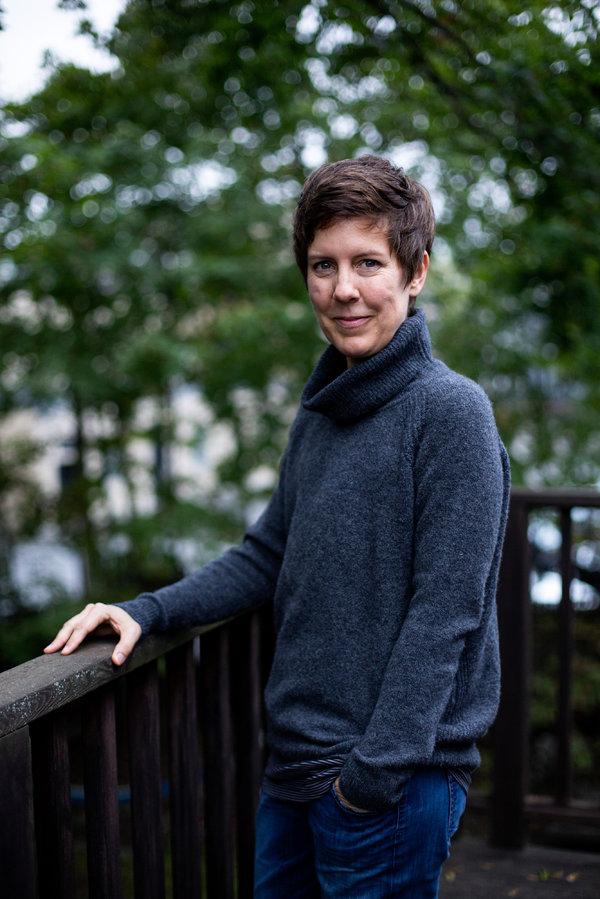In the recently published memoir “Flat: Reclaiming My Body From Breast Cancer,” Catherine Guthrie tells the story of grievous medical mistakes that she managed to record without sugarcoating their consequences or flailing against the injustice of it all. A women’s health reporter, Ms. Guthrie approached the cancer experience guided and guarded by her previous investigations. She nevertheless found herself stunned by the retrograde assumptions and defective practices of the physicians she consulted.
Eight years ago, I learned about Ms. Guthrie’s traumas when we met at a reception. She was a freelance journalist in her 30s and I was a professor of English in my 60s, but we instantly bonded. We were both living in Indiana and reeling from calamities related to our cancer treatments. Now, her landmark book persuades me that breast cancer care must be improved.
As “Flat” explains, all of the doctors Ms. Guthrie met assumed that she would want breast reconstruction after a mastectomy. One describes “how he would carve apart the largest muscle in my back, and, with one end of the muscle connected to its blood supply, tunnel the loose end (the flap) through my body and under my arm until it reached the empty socket on my chest where my breast had been.” Wouldn’t that weaken her back, she worried.
“Most women want to look normal in clothes,” the doctor informed her. But she knew that reconstruction could involve multiple surgeries that frequently result in major complications. Also, reconstructed breasts, which can “look normal in clothes,” may not feel much of anything.
To the queer ear of Catherine Guthrie, the doctor’s word “normal” rings a warning bell. Being queer means “pushing against cultural assumptions” of the norm. She worried less about appearance and more about preserving upper body strength. Balance was important, too, because of childhood scoliosis; she did not want to be lopsided. By conserving her back muscles, going flat would allow her to continue doing her favorite yoga postures: head and arm stands.
With its subtle analyses of the complexities of decision-making for breast cancer patients, “Flat” does not proselytize for any “proper” choice. Instead, it explores how challenging treatment alternatives remain. However, the book does implicitly argue that these judgments must be patient-driven. Ms. Guthrie counters her physicians’ objectionable suppositions about femininity while encountering the terrible wrongs they inflict.
The most shocking was made by an eminent surgeon. He removed both of her breasts without excising the cancerous lump. Hello? It is hard to wrap one’s mind around such a catastrophe, but Ms. Guthrie’s narrative embeds it in a succession of medical mishaps that serve as a warning: caveat emptor. Needless to say, a reoperation was necessary as well as an apology.
Buyers or patients must be wary even about seemingly minor procedures. After a dermatologist slices what looks like a mole off Ms. Guthrie’s flat chest, it turns out to be not a mole and not a recurrence but a second primary breast cancer tumor. The dermatologist also erred … in this case by possibly releasing cancer cells into Ms. Guthrie’s body. The growth should have been removed with wider margins by a cancer surgeon.

Without judging those who choose reconstruction, Ms. Guthrie encourages women to do “whatever makes them feel good, not what makes other people comfortable.” CreditKayana Szymczak for The New York Times
Has Ms. Guthrie lost faith in medicine, I wondered on turning the last page. “No,” she told me, although she does have “a heightened awareness of the fallibility of doctors and the limits of medical science.”
How does she feel now about her decision to go flat? “I am as strong, mobile and flexible today as when I was diagnosed,” she said. The ease of lying on her stomach in bed, on a yoga mat or at the beach “is priceless.” Noting “similarities between the flat movement and the queer movement,” Ms. Guthrie pointed out that some post-op patients are urged to conceal themselves, as if their condition were shameful: “The panic of being ‘seen’ or ‘outed’ is real.”
Without judging those who use prostheses, she encourages women to do “whatever makes them feel good, not what makes other people comfortable.” For Ms. Guthrie, “flat visibility is about refusing to buy into the narrative that women without breasts are disfigured.” The number of women who decide against reconstruction remains steady: 1 in 4 double mastectomy patients and 1 in 2 single mastectomy patients. But the notion that women who go flat must hide their bodies has become “antiquated.”
What improvements in care does Catherine Guthrie hope to witness? “I would like to see breast and plastic surgeons offer women the option to go flat as readily as they offer them the choice of reconstruction, with no bias or judgment or pressure.” She also believes that rural women should be getting the state-of-the-art attention urban women receive. During her treatment she moved to Boston, where she was surprised to discover that physical therapy was built into recovery plans. Among the approximately 1.5 million women who have gone through radiation for breast cancer, she wonders, “how many live with reduced mobility?” After radiation in Bloomington, Ms. Guthrie had not been offered physical therapy, although in her car she found it difficult to reach back and grab the seatbelt.
Still, the pleasures of small-town life permeate “Flat”: the gratifications of owning a house, of planting and weeding a garden, and of a community of friends who attend a “Boobapalooza,” a send-off party before surgery for which Catherine Guthrie’s partner, Mary, furnished “boob-shaped candles, boob lollipops and balloons that inflated into a buxom twosome” as well as “a pair of pink, plastic windup boobs with red, mouse-sized feet.”
Spoiler alert!
Not a mawkish misery memoir, “Flat” records how a youthful couple tackles and transcends the daunting challenges of disease and treatment. Reader, they marry.


Susan Gubar, who has been dealing with ovarian cancer since 2008, is distinguished emerita professor of English at Indiana University.

